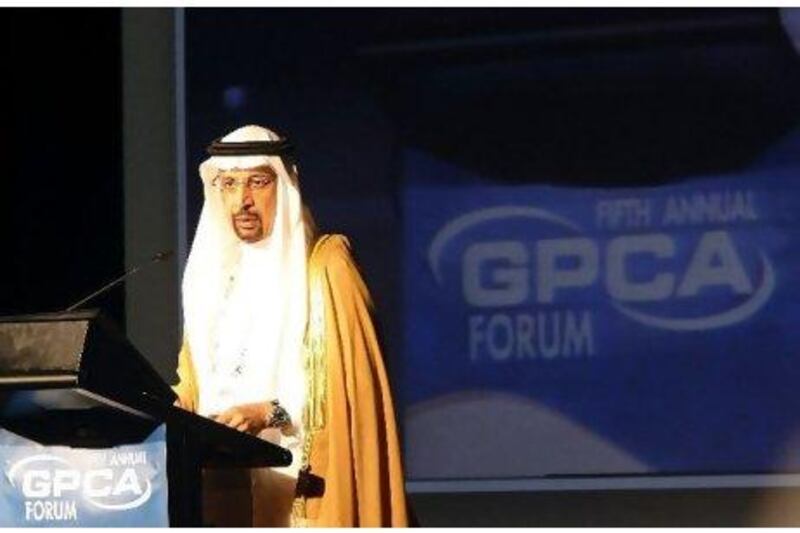The head of the world's largest oil company has called for a decade of sweeping change in the GCC's petrochemical industry to usher in a "golden age" of regional economic development.
Khalid al Falih, the chief executive of Saudi Aramco, said the GCC was entering a pivotal period in its development that could establish it as an international industrial hub to rival Europe.
Instead of seeking to double its annual revenue by 2020 under a "business-as-usual" model, the Gulf petrochemicals sector should seek to raise it fivefold to US$200 billion (Dh734.56bn) from $40bn currently, he said.
"The next 10 years will be in many ways a golden age for our region in terms of economic conditions and commercial opportunities but we also face many structural and demographic hurdles," Mr al Falih said yesterday in a landmark speech in Dubai at a forum of the Gulf Petrochemicals and Chemicals Association.
"We must seize this moment before it passes."
Developing the region's petrochemicals sector "far beyond" the production of basic chemicals was vital, he said.
"Today, the time has come for chemicals to step up and take its rightful place as a pillar industry" for the region, alongside the production and refining of crude oil, Mr al Falih said. "I firmly believe this is a key strategy to pursue if we are to create enough high-paying jobs for our youth.
"The strategic challenge for the region's chemicals industry is … to fundamentally alter its economic role within the region, to serve as a true enabling industry for other sectors and to leapfrog other regions within the global chemicals landscape," he said. "That, my friends, requires 10 years of transformation, not just tweaking around the edges of the existing business model."
Sharply higher investment in innovation and human capital, regional co-operation, and the development of more industrial clusters would be needed.
"We should think of the entire Gulf region as a potential mega-cluster for chemicals," Mr al Falih said. "We should look at the Gulf as a unified whole, rather than as a collection of smaller individual markets or, even worse, as a set of boxes which are walled off from each other."
Despite three decades of development and vast energy advantages, the Gulf's share of global chemicals production is still only 1.5 per cent, Mr al Falih noted.
He urged GCC states to increase investment in research and development and in their peoples' skills to "set in motion a tidal wave of innovation and creativity". Governments should encourage entrepreneurship and venture capital and foster opportunities for small and medium-sized enterprises in the chemicals sector.
In what he described as "stretch targets", Mr al Falih said the GCC chemicals industry should expand its workforce tenfold while boosting research and development (R&D) spending to 5 per cent of revenue from about 0.5 per cent.
"I will hazard a guess that at the most there are 500 true scientists, engineers and researchers currently employed in chemicals R&D across the GCC. I therefore propose that we establish an aggressive target of multiplying the number of R&D scientists and engineers at work in the sector by a factor of 50 over the coming two decades," he said.
Sheikha Lubna Al Qasimi, the Minister of Foreign Trade, told the conference the UAE aspired to "build up a highly competitive knowledge economy".
"We are pursuing this vision through the enforcement of highly effective intellectual property policies and the development of vital talent - especially among UAE nationals," she said.





